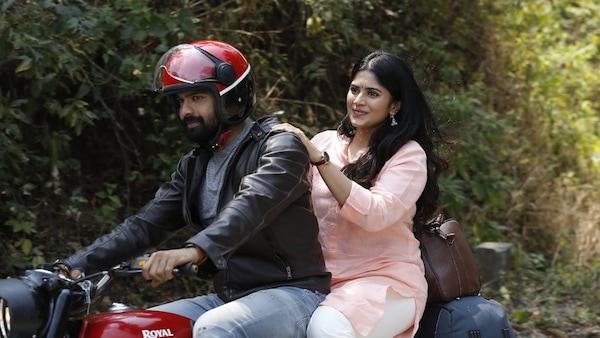Dear Megha review: Thrigun’s endearing performance uplifts this heart-wrenching romantic triangle
Director A Sushanth Reddy, while staying loyal to the Kannada original Dia, also retains its soul

Last Updated: 09.46 AM, Mar 30, 2023
Story:
Megha, a college student, has the hots for her batchmate Arjun, a basketball player and an artist. When she’s ready to express her love, destiny has other ideas. In another twist, Arjun returns to Megha’s life and love blossoms between the two. Their romance is brutally cut short by a tragedy. Will Megha move on and find love again? Make way for Aadi. What’s in store for the duo?
Review:
Dear Megha is the stuff that iconic romantic triangles are made up of - lovebirds pining for one another, dreaming of a ‘happily ever after future', until destiny makes it a habit to serve them one rude shock after the other. The story’s shock value comes from its tragic twists and turns and truly tests the ability of its protagonists to deal with heartbreak.
This is another boy-meets-girl story, yes, but what makes it different? Perhaps, it’s the unadulterated approach to romance, capturing the intensity and innocence of love with alarming simplicity. Without trying too hard, it builds on the idea of ‘soulmates’ and times its twists effectively to generate drama. Director A Sushanth Reddy’s film has a shaky start but the narrative gradually gains steam.
Like most Telugu films, Dear Megha initially tries to paint Megha as this cute, vivacious (‘bubbly’) girl who’s desperate for love. There’s this old-fashioned device of using the alter ego to express her mind and how her heart beats for Arjun. However, the film comes into its own when their romance eventually takes off. It captures the couple losing themselves in their world, focusing on their little joys - the promises, the gestures and the solace they find in each other’s company.
There are poetic stretches where the storytelling is extremely fluid - the filmmaker genuinely succeeds in making the viewer lose track of time. Whenever he does that, he also preps us for a brutal twist that changes the course of the narrative (you start fearing it). If the film establishes something effectively, it is the effort to capture the ephemeral nature of life. ‘Everything shall pass’ must’ve been on the mind of KS Ashoka during its scripting stages.
Barring select moments where the storytelling turns excessively diabetic - the early sequences between Aadi and his mom, Aadi’s midnight birthday surprise for Megha et al - the filmmaker’s conviction in his idea of ‘loving till death do us part’ keeps you invested. This is a film that showcases the ability of love to heal and destroy at once. The director, beyond the rosy segments, has a keen eye for drama and building narrative tension.
If there’s a complaint, it’s about the film ending in a thud - the director wants the suddenness of the event to stay with you and introspect on it later. However, while trying to recreate the impact of the Kannada original (Dia), this idea yields mixed results. In addition, Dear Megha pays the price for casting familiar faces and misses out on capturing the vulnerability of its characters.
Megha Akash is earnest but is always one step away from baring the soul of her character. However, this is certainly among her better performances in Telugu cinema. Thrigun succeeds in playing this diehard romantic with a silent, underplayed intensity; he has a charming on-screen persona and never lets the ‘sweetness’ of the character get on your nerves. Arjun Somayujulu has the makings of a good actor, though he needs to focus more on his dialogue delivery.
Pavitra Lokesh and Ananda Chakrapani bring dignity to their brief yet well-written roles. It’s a relief to see an on-screen mom advising her son to move on in life after a heartbreak and strike up a mature conversation. Hari Gowra’s soothing music score is an asset to Dear Megha; Baagundi Ee Kalame is a tranquil-little gem that has you craving for more.
The balance between realism and drama in the treatment is the main compromise of this remake - it aims for a larger-than-life, cinematic flourish. The director opts for a vibrant, livelier colour palette (unlike the original) and you can sense that the characters in the film are a conventional hero-heroine by their costumes, hair and makeup. Look past these minor pitfalls and you wouldn’t mind Dear Megha.
Verdict:
Dear Megha, a faithful remake of the Kannada film Dia, is a largely charming, old-world romantic triangle with a pure and unadulterated take on love. A few brutal twists alter its course and add drama to the story. Thrigun shines in an enthusiastic performance, while Megha Akash and Pavitra Lokesh get ample scope to shine. Hari Gowra’s memorable music is the icing on the cake.
(The film is now streaming on ETV Win )
Subscribe to our newsletter for top content, delivered fast.

